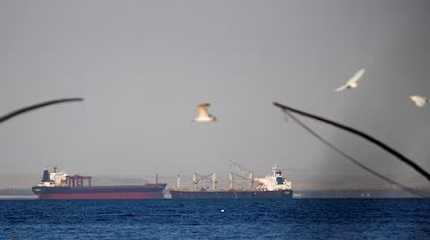
NEW DELHI/WASHINGTON, Jan 18 (Reuters) - The Indian Navy said on Thursday it had rescued the crew of a U.S.-owned vessel in the Gulf of Aden after an attack by Yemen's Houthi movement as tensions in the region's sea lanes disrupted global trade.
Following the attack on the U.S. Genco Picardy late on Wednesday, the U.S. military said its forces had conducted strikes on 14 Houthi missiles that "presented an imminent threat to merchant vessels and U.S. Navy ships in the region".
Attacks by the Iran-allied Houthi militia on ships in and around the Red Sea since November have slowed trade between Asia and Europe and alarmed major powers in an escalation of the war between Israel and Palestinian Hamas militants in Gaza.
The Houthis say they are acting in solidarity with Palestinians and have threatened to target U.S. ships in response to American and British strikes on the group's positions.
The strategy pursued by U.S. President Joe Biden - a blend of limited military strikes and sanctions - appears aimed at preventing a wider Middle East conflict even as Washington seeks to punish the Houthis, security and military experts say.
But it is unclear whether it will accomplish Biden's main goal: halting attacks by militants that are causing supply bottlenecks and raising fears that inflation could reignite.
After the latest attack, India diverted a warship deployed in the region to rescue the 22 crew on board the Genco Picardy, including nine Indians. The crew were all safe and a fire on board the vessel had been extinguished.
The Houthi movement said its missiles had made a "direct hit" on the bulk carrier. Shipping operator Genco confirmed the attack, and said its vessel was hit by a projectile while it was passing through the Gulf of Aden with a cargo of phosphate rock.
SUEZ CANAL SUFFERS
The attacks target a route that accounts for about 15% of the world's shipping traffic and acts as a vital conduit between Europe and Asia.
The alternative shipping route around South Africa's Cape of Good Hope can add 10-14 days to a journey compared to passage via the Red Sea and the Suez Canal.
A sharp downturn in revenue from the Suez Canal has struck a painful new blow to Egypt's already deteriorating economy. The chairman of the Suez Canal Authority said last week that revenue had fallen by 40% in the first 11 days of January.
Wheat shipments via the Suez Canal tumbled almost 40% in the first half of January to 0.5 million metric tons, the World Trade Organization said on Thursday.
The Red Sea crisis was rippling through the business world and reviving concerns about stretched supply chains that emerged when activity picked up after the COVID-19 pandemic.
The re-routing of a growing number of vessels is altering refuelling patterns and boosting demand for bunker fuel used by ships at far-flung ports, from Mauritius to South Africa to the Canary Islands.
Denmark's Maersk (MAERSKb.CO), opens new tab and other large shipping lines have instructed hundreds of commercial vessels to stay clear of the Red Sea. The attacks, as well as weather-related closures and stoppages in Europe, risked causing congestion at several container terminals, Maersk told its customers on Thursday.
Officials at Rotterdam Port, Europe's largest, expect traffic to become busier from the end of January as delayed ships start to arrive but they do not expect any serious logistical issues.
Ports in Italy and France are worried about being bypassed as ships steer away from the main Mediterranean route.
"We are not observing a significant impact as of today but it's a concern," Christophe Castaner, chairman of Marseille port, told a press conference on Thursday.
If the crisis persists, one scenario could be that vessels travelling around Africa call in at Morocco and transfer goods to other ships to serve the Mediterranean, he added.




